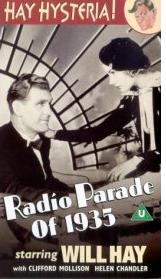Radio Parade of 1935
| Radio Parade of 1935 | |
|---|---|
 | |
| Directed by | Arthur B. Woods |
| Written by | Paul Perez |
| Produced by | Walter C. Mycroft |
| Starring | Will Hay Helen Chandler Clifford Mollison Davy Burnaby Alfred Drayton |
| Cinematography | Cyril Bristow Phil Grindrod |
| Edited by | Edward B. Jarvis |
| Music by | Benjamin Frankel |
Production company | |
| Distributed by | Wardour Films |
Release date |
|
Running time | 96 minutes |
| Country | United Kingdom |
| Language | English |
Radio Parade of 1935 (1934), released in the US as Radio Follies, is a British comedy film directed by Arthur B. Woods and starring Will Hay, Clifford Mollison and Helen Chandler.[1][2]
Plot
The film tells the story of the sophisticated Director General of the National Broadcasting Group (Will Hay) who promotes the ambitious Head of Complaints to Programmer Director (Clifford Mollison) in an attempt to stem the number of complaints he is receiving owing to the station's overly intellectual programming. In 1930s British slang, the acronym "NBG" stood for "no bloody good". The character played by Hay is clearly intended to be a satirical parody of Lord Reith, and the NBG the BBC.
Cast
- Will Hay as DG.William Garlon/Garland[3]
- Helen Chandler as Joan Garland
- Clifford Mollison as Jimmy Clare
- Davy Burnaby as Sir Frederick Fotheringhay
- Lily Morris & Nellie Wallace as Charladies
- The Western Brothers as Announcers
- Alfred Drayton as Carl Graham
- Gerry Fitzgerald & Arthur Young as Window Cleaners
- Claude Dampier as Piano Tuner
- Robert Nainby as Col. Featherstone Haugh Haugh
- Hugh E.Wright as Algernon Bird
- Jimmy Godden as Vere de V. de Vere
- Basil Foster as Capt.Esne St J. Entwistle
- Ivor McLaren as Eric Lyttle-Lyttle
Production background and preservation status
Two sequences in the film were filmed in Dufaycolor. The film is extant.
See also
References
- ^ "Radio Parade of 1935 (1934)". BFI.
- ^ "Radio Follies (1935) - Arthur B. Woods | Synopsis, Characteristics, Moods, Themes and Related". AllMovie.
- ^ Name is spelled Garlon on door of character's office in the first few scenes but referred to in speech as Garland
